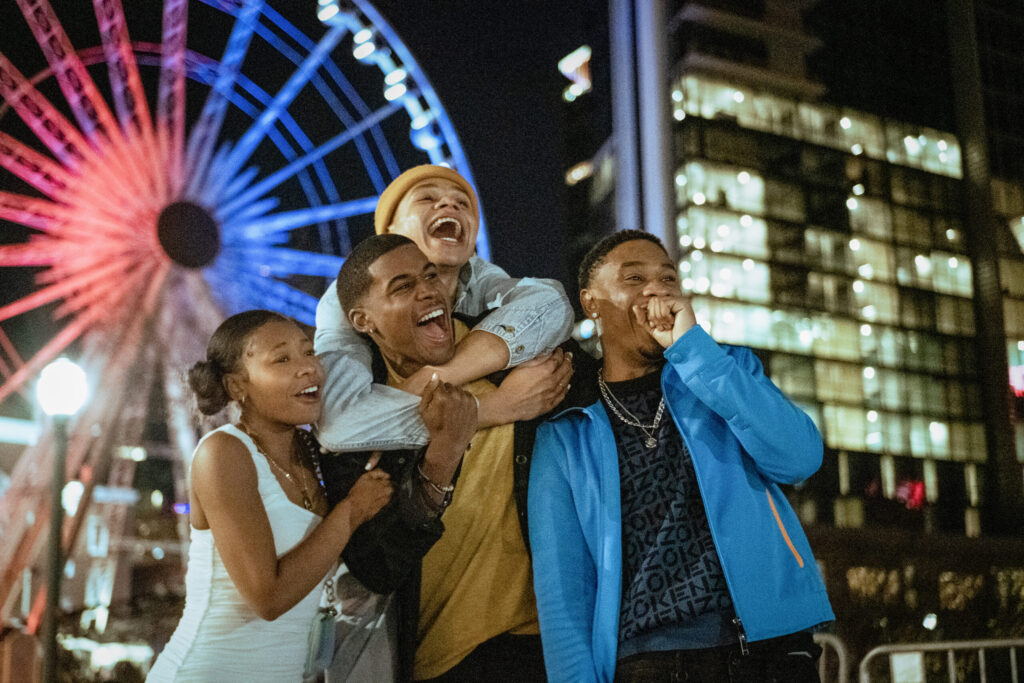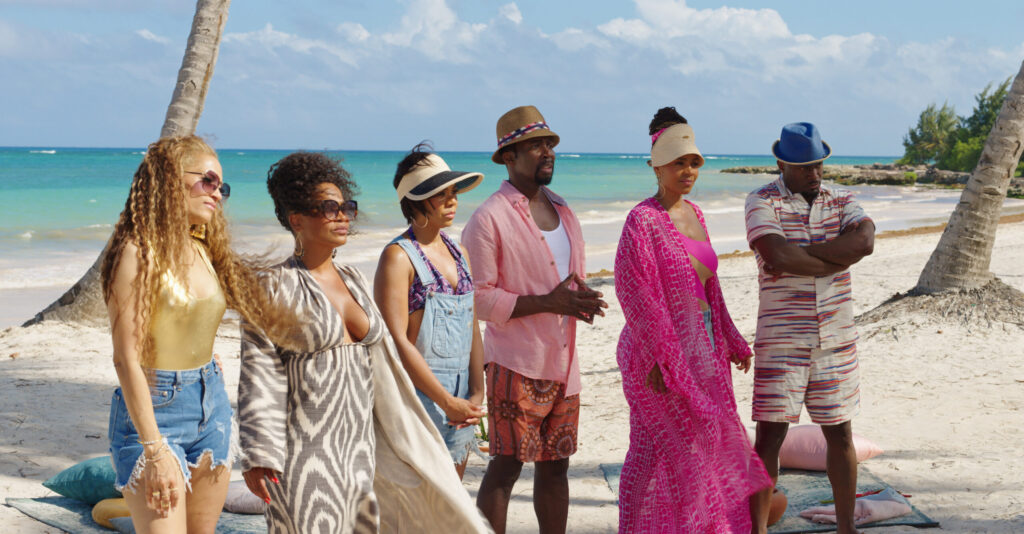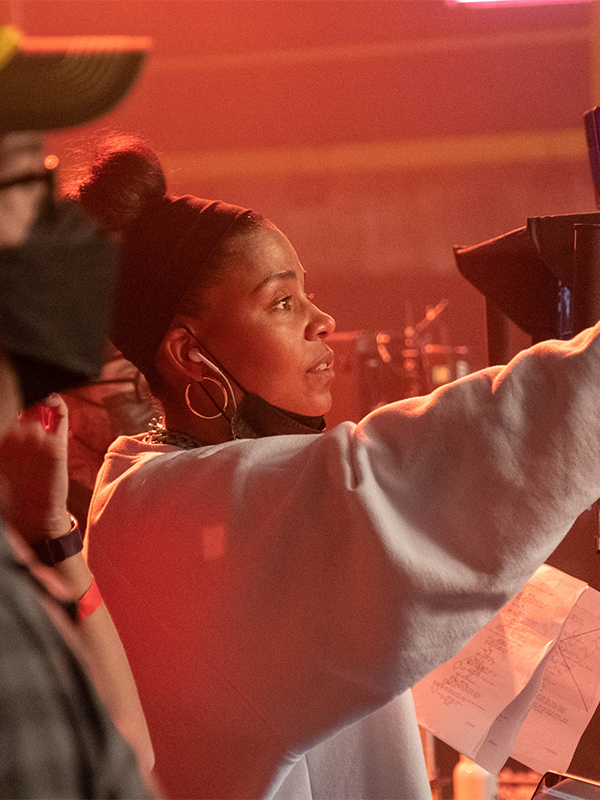The 2023 Oscars is right around the corner, with some recognition of the strides Black Hollywood is making in film. Angela Bassett is nominated for Best Supporting Actress (for Black Panther: Wakanda Forever) and Brian Tyree Henry is nominated for Best Supporting Actor (for Causeway). Rihanna and Tems are also nominated in music categories for their contributions to the Black Panther: Wakanda Forever soundtrack, and the movie also garnered Oscar nods in the categories of Best Costume Design, Best Visual Effects, and Best Makeup & Hairstyling.
While for many, being recognized by the Academy is a high achievement in film, the scarcity of nominations for Black people this year (really every year) brings important questions to the forefront.
Sweet July asked some of the industry’s biggest contributors—Tracey Edmonds, Sanaa Lathan, Malcolm D. Lee, Tonya Lewis Lee, Deon Taylor and Amirah Vann—to discuss just how far Black people in the business of making films have come, why our stories and representation are so important, and where we need to go to continue to show up and shine in the industry.
“I truly believe this is a renaissance for Black filmmakers and Black creators,” says self-taught filmmaker, writer and director Deon Taylor, whose strong contribution to the horror movie genre, Fear, was released this past January. The film was produced by Hidden Empire Film Group, which was founded by Taylor alongside his wife and fellow film industry power player Roxanne Avent-Taylor as a vehicle to produce and distribute film projects that center Black perspectives.
Actress, producer and now director Sanaa Lathan agrees that a Black film renaissance is taking place—and she’s all the way here for it. “When I came up, there were very few Black directors, unfortunately, that I worked with,” says Lathan. “Now that the world and Hollywood [are] demanding representation in front [of] and behind the camera, it’s so exciting to see this renaissance of people of color creating content as well as women of color. I just feel lucky to be able to be a part of it and witness it.”

Whether it’s a laugh-out-loud comedy or a dark horror, the first-time director of On the Come Up wants to see Black Hollywood continue to think outside of the box when it comes to storytelling. “I just want to see more of the full range of our humanity as people,” adds Lathan. “I love the fact that it can inspire somebody, that it can give them hope, that it can make them feel better in the moment, that it can help them, it can be cathartic. I just want to see more fully realized, well-thought-out stories about us.”
As television producer and personality Tracey Edmonds points out, there’s still work to be done to make this a more ubiquitous reality. “We still need more Black execs at the studios who are empowered to select the projects that are developed and to greenlight films into production,” says Edmonds, noting that less than 6% of the writers, directors, and producers of U.S.-produced films are Black. “I am optimistic that things are headed in the right direction, but there is still more progress to be made.”
Part of Edmonds’ mission is to challenge the status quo with projects like her very first one for Netflix, End of the Road, starring Queen Latifah and Ludacris. She says it captured the number one spot in 50 countries for two consecutive weeks and was placed in the top 10 in 93 countries.
Edmonds adds that we’re increasingly witnessing streaming platforms create space for Black stories. “Streaming services have recognized the desire of the public to consume more diverse media and have, consequently, even cultivated collections of Black films through special categories like ‘Black Stories’ and others,” she says. Presently, Netflix, HBO Max, Disney+ and Hulu have this category. The hope is that more streaming platforms will follow suit.
Moments like Will Packer’s directorial debut for last year’s Oscars are also worth noting, says Taylor. “How he handled the Oscars to me was incredible. He infused church, choir, acting, comedy, legendary performances.” Packer’s Oscar achievement mattered even more because he made history for being the first to employ an all-Black production team for the 2022 show. Taylor believes that Packer is “on the cutting edge” of cracking the code for what culturally relevant and commercially viable films at this particular point and place in time look like. And he’s not the only one.
“I think there are a lot of filmmakers and creatives that are pushing the medium forward,” says writer, producer and filmmaker Tonya Lewis Lee (wife of groundbreaking filmmaker Spike Lee). “People like Gina Prince-Bythewood, Dawn Porter, Ryan Coogler, Questlove and Stanley Nelson are making great work right now.”
Filmmaker Malcolm D. Lee has been striking industry gold since 1999, with the release of his very first project, The Best Man and its follow-up, 2013’s Best Man Holiday. And he shows no signs of slowing down.
But Lee (cousin to Spike Lee) says that when it came time to continue the story and extend the successful franchise, he was met with resistance. “It took a while, trying to get the right streamer to partner with,” he says. “But, we finally did it. And here we are”—referring to the latest eight-episode series, The Best Man: The Final Chapters, which aired on Peacock this past December and reached Nielsen ratings’ coveted Top 10 ranking, the very first Peacock original to achieve such a feat.

Lee, whose other projects include Girls Trip and Night School, advises any Black creative who wants to work in the film industry to learn the art of persistence. “You have to stick to it. This is an industry that tells you no a lot, right? And you’re gonna get rejected, but you can’t let it discourage you.”
That kind of mentality also extends to talent in front of the camera. “I will continue to look for work that my daughter, family and community can be proud of and that elicits questions, conversation, and opportunities for growth,” says Amirah Vann, who most recently appeared in Tyler Perry’s A Jazzman’s Blues for Netflix.
When it comes to the work of Black filmmakers, “I have witnessed their excellence firsthand,” adds Vann. “The jobs they are providing for Black and Brown people and women extend from behind the camera to in front of the camera, including directors, producers, department heads and actors. The Black film community—we ‘understand the assignment’ as we say!”
So where do we go from here? Taylor has some ideas. “Something I’m also fighting for is to be able to create ownership, where we actually finance and fund those movies and allow them to play in the commercial market,” he says.
Taylor also points out that the path to independent film success, which he says has been paved by people like Rudy Ray Moore (Dolemite) and Melvin Van Peebles (Sweet Sweetback’s Baadasssss Song), is an important one to keep paving. “I think that’s next.”
As the best of Black Hollywood continues to work hard to make notable projects, platforms like the NAACP, BET Awards, the Black Reel Awards and the American Black Film Festival are also seeking to shine a light on this filmmaking—an effort that helps offset the underrepresentation found within longstanding shows like the Oscars. But Lewis Lee says that’s not the only way to acknowledge accomplishments in film.
“The best way to celebrate Black films is to support them when they come out,” she says. “Go see them in theaters, talk about them on social media and galvanize behind them. That is what allows us to keep making them.”







